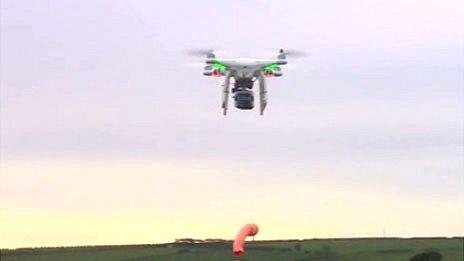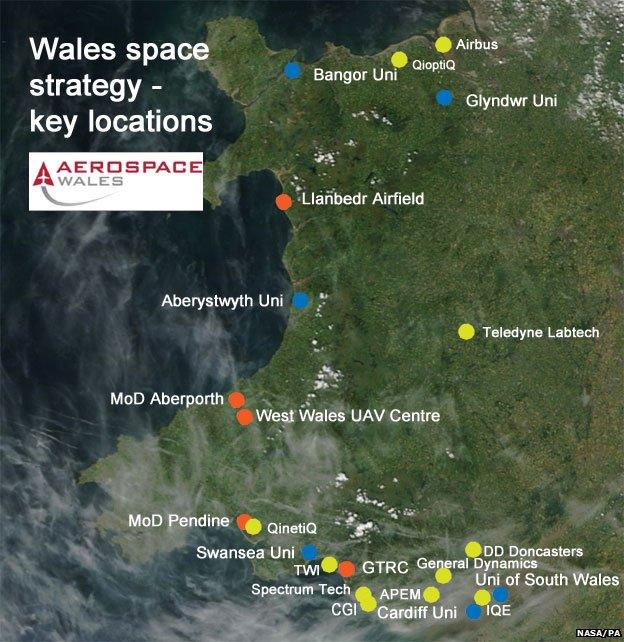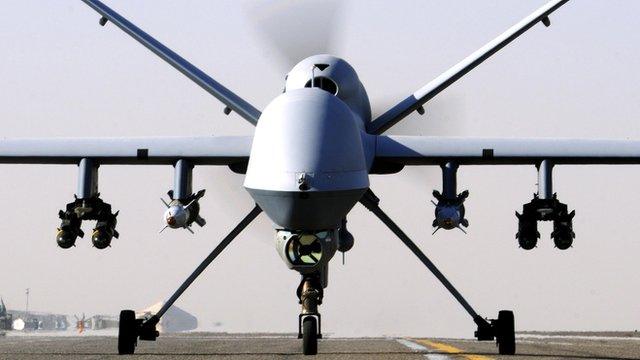Mission: Wales aims for £2bn a year from space industry
- Published
Wales has been set a 15-year mission - to boldly go for a £2bn-a-year share of the space industry.
Clusters of "space activity" involving aerospace and technology firms working with university research centres would be developed in a new strategy from the Aerospace Wales Forum.
The aim is for Wales to generate 5% of the UK space industry by 2030.
The growing importance of the market for unmanned aerospace and satellite technology is also recognised.

What do we use space technology for?

A drone at the Aberporth test base
Telecommunications
Weather
Environmental analysis
National security


Some of the space firms, installations and academic research centres across Wales already
It is estimated the UK economy for the space industry will be worth £40bn a year by 2030 - and Wales can have a share of it.
The strategy recommends:
Promoting clusters around scientific, academic and industrial expertise including in unmanned aerial systems (UAS), rockets and satellites
Wales building on its existing aerospace, electronics and software industries which employ more than 50,000 people and look for them to diversify to supply the space industry
Develop skills for the space sector and internships and apprenticeships for students and co-working between universities and enterprises
Developing a civilian UAS cluster - work with the Ministry of Defence to use locations like the Aberporth Range - which could lead to "intelligent" products for the consumer market, as well as emerging applications like precision agriculture, environmental services and critical infrastructure monitoring.

Dr Lawrence Tyler of Aberystwyth's space robotics group is involved in developing "smarter" rover technology
Scientists at Aberystwyth University have already been involved in the development of the Mars rover vehicle, as well as the earlier Beagle 2 mission., external
They are now involved in the European ExoMars mission set for 2018, external to look for signs of life on the planet and they will calibrate the cameras and turn the raw data into useful scientific results.
"People are surprised what's going on in Aberystwyth and across Wales," said Dr Lawrence Tyler, research associate in the university's space robotics group.
"The public generally don't often associate the space industry with Wales but there's a lot of very interesting work going on in the research and industrial side into space and related projects."
Data gathered from satellites and unmanned drones like those operating from Llanbedr near Harlech, Gwynedd, are a key part of the space strategy that has been written by industry group Aerospace Wales Forum and the Welsh government.
Llanbedr is also one of six sites being considered for the UK Government's spaceport.
'Very proud'
If chosen, it could see the early stages of commercial space travel by 2018.
Denbighshire company Qioptiq provided ultra-thin glass components, external for the Rosetta craft, which landed on comet 67P/Churyumov-Gerasimenko, as well as the Mars missions and Nasa's Kepler probes,, external as well as satellites.
"Over recent years, the majority of satellites you see in the sky, our products will be on them,. We're pretty unique around the world," said general manager Christopher Hardy.
The work extends to GPS systems and helping to develop wi-fi in the developing world.
The ambition for Wales is challenging but Qioptiq, something of a business secret, has a track record going back to the 1970s.
"We're very proud of what we do," said Mr Hardy. "Even local people are surprised about it. We don't tend to shout it but it's all good - and we're here to stay."
Not science fiction but science fact - and Welsh companies are now being asked to play their part in the future.
- Published13 July 2015
